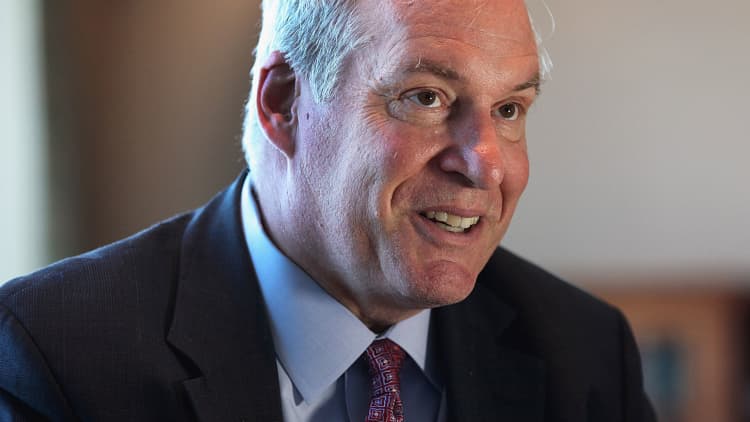
Boston Fed President Eric Rosengren told CNBC on Friday he doesn't expect the U.S. economy to need another round of quantitative easing, but cautioned that he couldn't rule out the option.
"I don't expect that we need to," Rosengren said during an exclusive interview on "Squawk Box." "If the economy got weak enough that it was required, we should do it. I certainly hope and I don't expect that will be the case, but I can't rule anything out at this time."
Speculation over how the Fed will respond to volatility on Wall Street and to concerns over European growth has intensified after Wednesday's wild selloff.
On Thursday, St. Louis Fed President James Bullard helped calm markets when he suggested the central bank could pause the wind-down of its easy money policy and wait for more economic data in December. Both Rosengren and Bullard are nonvoting members of the Federal Open Market Committee, the Fed's policy-setting board.
During his CNBC interview, Rosengren added that Fed officials need time to fully process what's causing widespread turmoil in the financial markets before making a judgement on changing the pace of winding down the current round of quantitative easing.
"Financial markets have been quite turbulent," Rosengren said. "I would remind you though that just a couple months ago we were talking about how little turbulence there was. It's going to take us a little time to fully process what exactly is the reason for the turbulence."
The Boston Fed president said his forecasts for interest rate hikes in mid-2015 remained the same, but that he would watch whether market turbulence portends something more serious.
"So far the economic data has not shifted enough to make me think that my overall forecast would be dramatically different," Rosengren said.
The Fed should raise short-term interest rates one year before inflation hits 2 percent and the labor market sees full employment, Rosengren said, reiterating his rate hike forecasts. He said the pace of inflation has slowed significantly, however, because of a strong U.S. dollar and plummeting oil prices.
Inflation won't reach his 2 percent target for several years at the current pace, he said.


